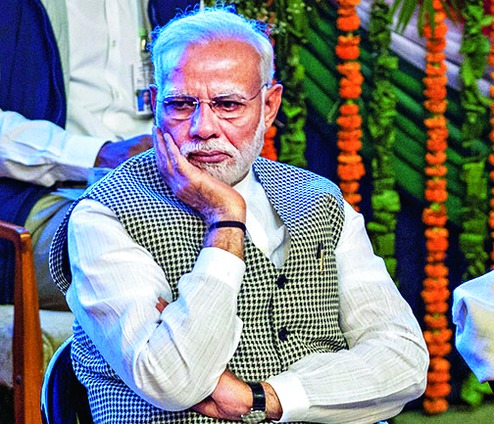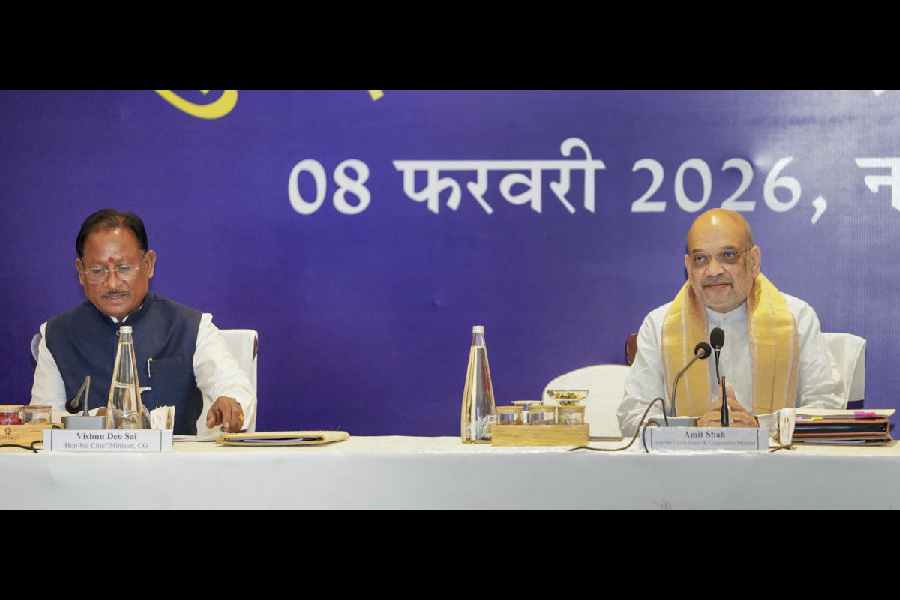
If you read more than one English newspaper in India, moving from one to the other can feel like travelling between alternate realities or parallel worlds. The front page of this Sunday's Hindu led with the floods in Assam, Bihar and Odisha: "80 dead, 50 lakh displaced as rains pound north & east". Apart from the headlined story, there was half a page inside the paper that carried photographs and brief reports on flood havoc from Assam, Bihar, Bangalore, Gurgaon and West Bengal. There was a report on 30 people killed in lightning strikes in Odisha. Headquartered in faraway Chennai, the Hindu reported a disaster in eastern India as if it mattered to a national readership.
The Indian Express, which is the other daily I subscribe to, had no mention of the floods or the death and displacement that they had caused on any page. Above the fold, the headlines were concerned with the high politics of Hindustan: the concern that the BJP's Dalit MPs had expressed about attacks on Dalits and Muslims in the name of cow protection, the prospect of the BJP nominating a Dalit as its chief ministerial candidate in UP and the defence minister's jibe at a film star.
There was a story on page three about Delhi's heaviest downpour in 10 years but the only climate death reported in the paper was the death of a man who fell into a pothole in Vasant Kunj and was run over by a truck. "Rain claims first casualty," went the strapline. For someone who depended on the Express for his information, this would have been literally true.
Rifling through back issues of the paper, I found two mentions of the floods, both in last Saturday's paper. There was a striking front-page picture of a woman in a boat hanging saris out to dry in a submerged Assamese landscape. On an inside page, the paper's correspondent in Assam had filed a story on the feeding of five golden langurs stranded on one of the Brahmaputra's many riverine islands. Neither the photograph's caption nor the story inside so much as mentioned the devastation wrought by the floods. It couldn't have for lack of information; someone at the edit desk decided that the one item fit to print about the floods was this tale of hungry langurs. The only 'human interest' story the Express could find in this landscape of suffering featured five monkeys.
The Express is a first-rate newspaper with a storied past. It is adversarial and independent at a time when most media organizations aren't. It is a national newspaper with ten separate editions, one of which is published out of Calcutta. It has a very able correspondent in Assam. What, then, explains this Churchillian indifference to an Indian tragedy?
One explanation is the insularity of media organizations headquartered in Delhi. This point was trenchantly made by the Trinamul MP, Derek O'Brien, in a recent column where he wrote that in the capital's echo chamber, a minor flood in Gurgaon was national news while "a week-long flood in say West Bengal or Assam, which displaces thousands and kills maybe 50, is a small-time 'regional' story". Perhaps a pan-Indian newspaper based in Chennai is more sensitive to the significance of floods in Bihar than one headquartered in Delhi because it doesn't reflexively think of India beyond its city limits as a kind of receding hinterland.
But there's more at work here than smug insularity; it is also a failure of the journalistic imagination. Newspaper reports are human narratives with protagonists: heroes, villains, minor characters, extras. A flood seems like an act of god or nature and unless there is an obvious human error that triggers it, there are no heroes or villains, just victims - dead and displaced people with no speaking roles, nameless extras. After the event, when political post-mortems are done, there might be callous politicians to blame and brave relief missions to praise, but the event as it unfolds seems too elemental to storify. It would be different if a flood submerged a city: there would be streets to name, drowned neighbourhoods to mourn, stories to be told about newsworthy humans with that indispensable quality, name-recognition.
This sounds colonial in its selective humanity. It is. One reason why Churchill and the government of India let millions of Bengalis starve to death in 1943 was because they saw hunger and starvation as endemic to Indian agriculture. Famines were Malthusian acts of god. They could be mitigated, but they couldn't always be prevented. If pressed, colonial officials might have said that there was a cyclical quality to rural suffering in eastern India: there were good times and bad times, but not much changed.
Through the Sixties and Seventies the Statesman's Delhi edition would unfailingly publish, every monsoon, a picture of a bus submerged in floodwater under Minto Bridge. It was like a seasonal bloom; a way of marking the arrival of the rains. In the imagination of a metropolitan newspaper or news channel, floods that drown or displace anonymous people in eastern India during the monsoons are like fixed dates in a calendar, gazetted disasters. I suspect some newsrooms have an unspoken rule of thumb, a qualifying death toll that act-of-god catastrophes have to rack up before they become newsworthy and visible. Displacement, even in the millions, doesn't seem to count.
Ironically, while the floods were missing from the Sunday Express's front page, it did feature a photograph of Amitav Ghosh at the "Express Adda" hosted by the newspaper the previous evening. It was ironic because during the discussion of his book on climate change, The Great Derangement, Ghosh returned repeatedly to the failure of novelists and journalists to reflect on and write about climate events in a sustained way. He suggested that there was a willed amnesia to the way in which we treated each climate catastrophe as a random fury, when each drought, each flood could be a symptom of cumulative climate change. If he is right and the gathering consensus about global warming is correct, there will come a time when it will be harder to ignore climate catastrophes as things that happen elsewhere to nameless people. The least newspapers can do, meanwhile, is to report on the plight of people who live through these disasters, and to count the dead.
mukulkesavan@hotmail.com










